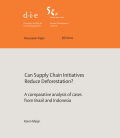The benefits of hydropower as a source of clean energy with low greenhouse gas emissions are in stark contrast with its negative local social and environmental impacts. This briefing paper discusses this contradiction and the rising importance of affordable clean energy from hydropower in emerging and developing economies. Since hydropower is back on the development agenda this momentum should be used to invest in more environmental and social friendly schemes.
This article explores the regional disputes on the shared river and the degree of cooperation that exists. Despite prevailing negative impacts – i.e., the changes in sedimentation and the river flow regimes – caused by upstream dam construction in Turkey and affecting downstream Georgia, the article finds that the creation of a regional electricity market seems to be opening up a new avenue for cooperation between Turkey and Georgia also on the so far unilaterally utilized river.
When compared to other regions, Asia has the highest rate of policy innovations that can help in the transition to a green economy. Even though fiscal instruments in-use are to some extent already altering aggregate demand of resources and economic activities, resource allocation, and distributive capacity of the economy, instrument such as “carbon tax” that has the real potential to contain rising emissions and save economies from getting locked into carbon-intensive pathways are yet to be adopted widely. Sporadic adoption of fiscal instruments is not going to be enough, if Asia as a region, is to transition to a green economy. In addition, there are substantial implementation barriers that need to be eased for wide-scale adoption and diffusion of green fiscal instruments.

This book identifies the drivers and success factors of green industrial policy, which seeks to reconcile the synergies and trade-offs which exist between economic and environmental goals. Greening the economy is a goal which will require enormous investment. As markets are currently failing to provide the required incentives for environmental sustainability, governments must intervene and provide ‘policy rents’ for investments in sustainability while withdrawing rents from polluting investments. In this they will face the risk of political capture by interest groups and difficult choices among technologies. Rent management is therefore the heart of green industrial policy and the focus of this book. On top of this, the country examples provided in this volume focus on the emerging powers, which will have an important influence on the future of our planet.
